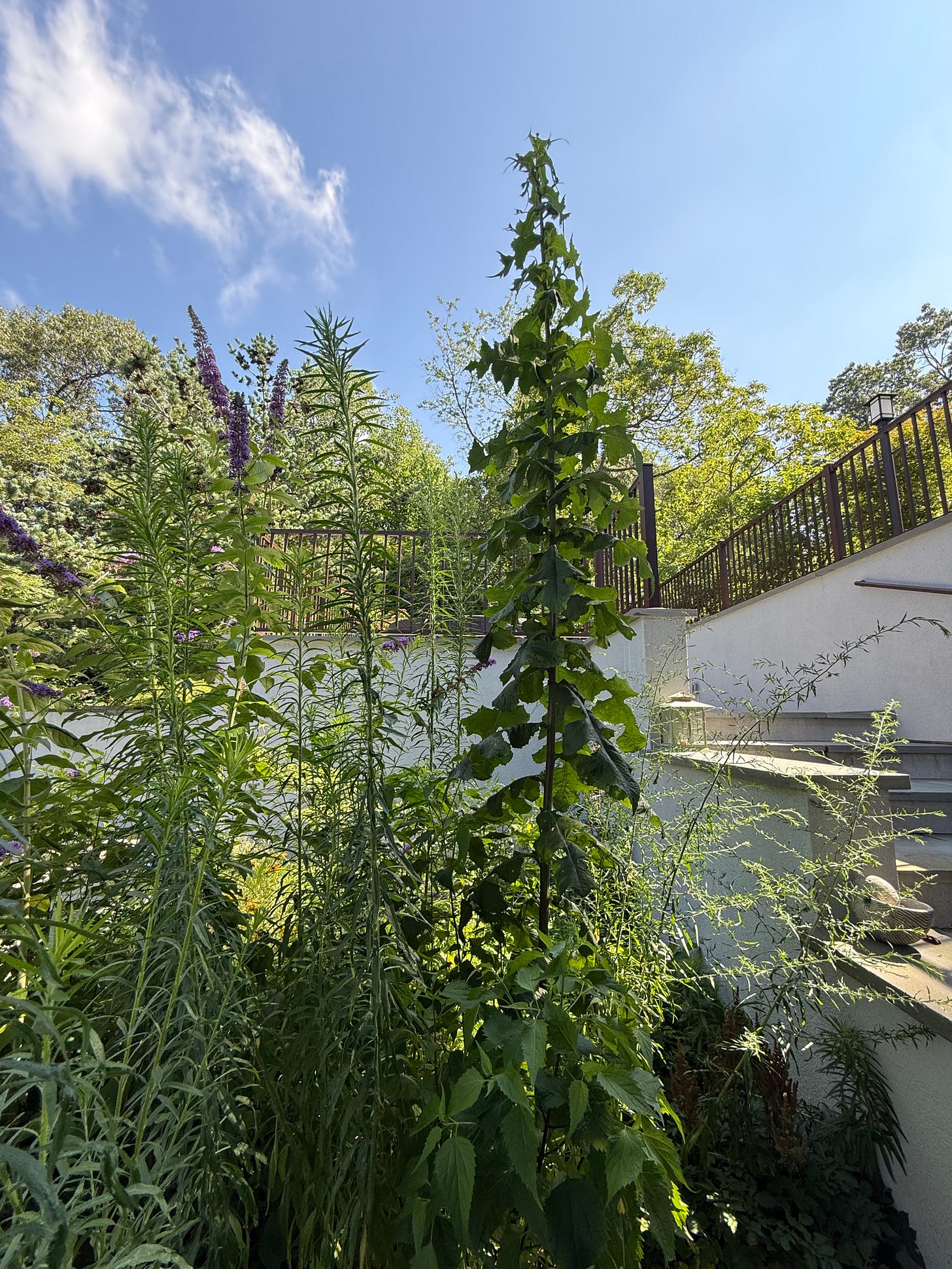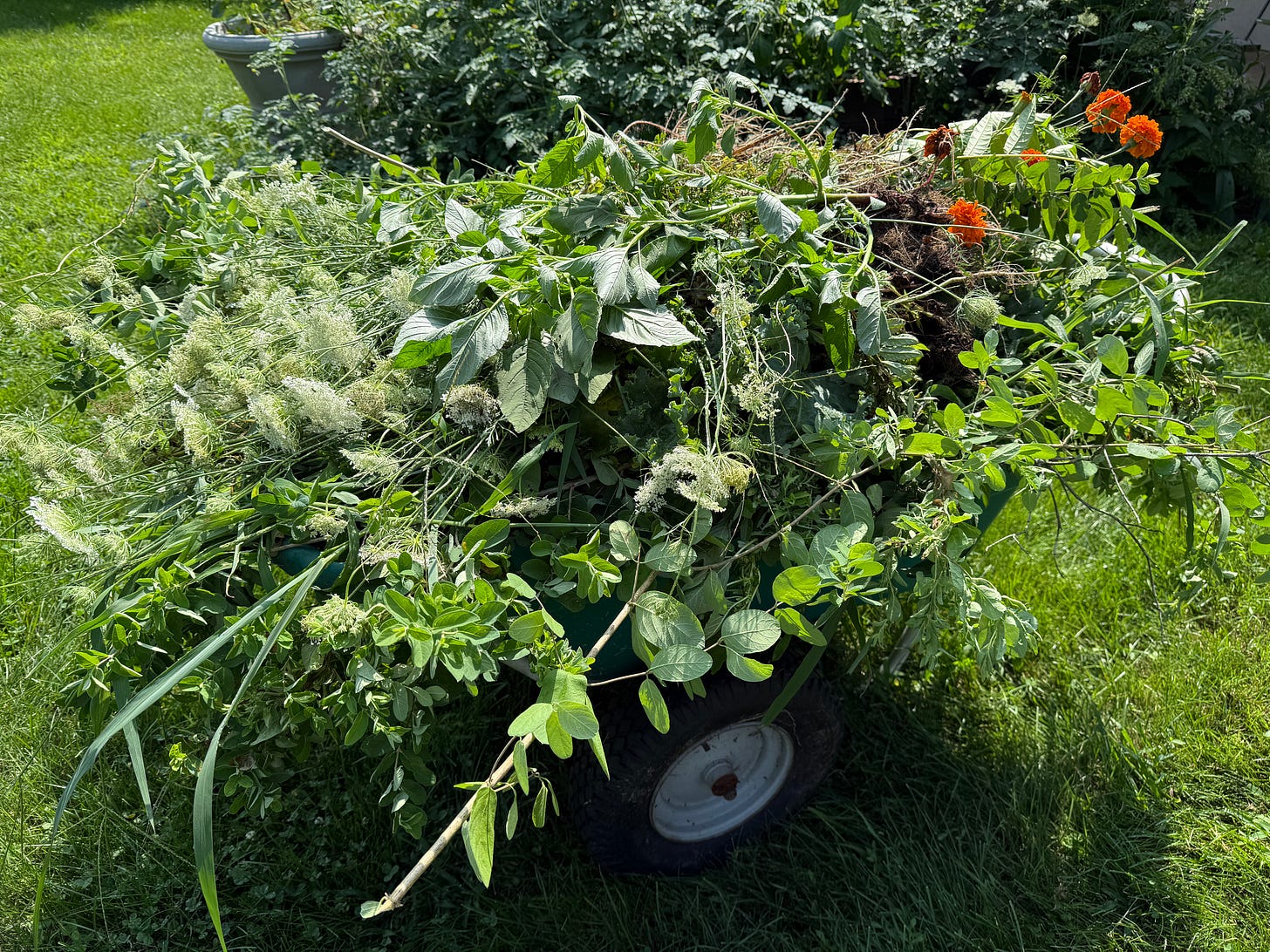Yes, I have started “weeding” again.
After almost two full years of not weeding, I am starting to better understand balance and our human role in maintaining it. But also our human role in creating the chaos that we see in nature and the world around us.
Sure, it’s almost August, and this is always the time of year when nature and our gardens go feral. It’s not unusual to come back from a week’s vacation and find squash or melon vines have overtaken the yard. Or the “fight” with weeds gets abandoned out of sheer exhaustion. I’ve been noticing the sides of roads covered in invasive species, dead trees covered in vines, their tangled messes taunting us that everything is out of control, and other than torching it all down, we are trapped. Stuck. Kind of like the global political situation right now.
But lately I’ve been remembering a road trip we did in upstate New York about 20 years ago. I think we were going to the Chautauqua Institute. Ah, yes, I was going to hear the Great Theo Colburn, author of Our Stolen Future, speak about her research on chemicals and our bodies, specifically endocrine disruptors.* We came to a stretch of highway that was beautiful beyond belief. It looked like a historical painting from a museum of how nature used to look. Mature trees stood gracefully at attention next to the highway, and rivers wove through meadows that were lined with diverse and healthy-looking plants of all sorts. Grasses waved in the breeze, confident in their beauty. Ferns blanketed the forest floor.
“What is this place?” I remember asking with awe. Turns out it was the Allegany Indian Territory, which is part of the Seneca Tribal Reservation. There was a marked difference between the Indigenous territory land management and the “American” approach. The Indigenous land felt gently managed, but in a holistic, healthy, respectful way. It felt at peace. The rest of “our” land felt managed by machines, and was chaotic, a violent attempt at control without respect for nature. Kind of like our whole country right now.
We can wallow in our collective misery about the lack of control and utter chaos of this moment. Or we can seek balance and take action. Yesterday, I put on my long pants and went out, and started pulling up things that were making it hard for me to access my already too overgrown vegetable garden. As sweat dripped down my face, I realized that the deep squats I do while I am weeding are actually just the exercise I need to strengthen my ability to get up and down from things, which I had recently noticed was waning. I cut back some truly giant pokeweed before the berries ripen and stain everything. I was glad I did my experiment of not weeding because it taught me so much. One of the things it taught me is that it’s okay to relax and let nature do its healing work. It’s fun to see what happens when you let things go a little. I have one plant that is almost 10 feet tall and still hasn’t flowered, and I’m excited to see what it looks like when it does. But it is also teaching me that it’s okay to work with nature and do some gentle managing. As long as I’m respectful, that is.
Another way we can take action is to keep learning. That is why I’m very excited to take a four-week online course with Dr. Lyla June Johnston (Diné/Tsétsêhéstâheseon) on Becoming a Regenerative Human (starting August 10). This past February, I heard Dr. Johnston give the final keynote speech at PASA, the Pennsylvania Sustainable Ag conference, and was blown away. From her bio: “She graduated from Stanford University with honors with a degree in environmental anthropology, holds a masters degree in Indigenous Teaching Methods from the University of New Mexico, and honors the traditional Indigenous teachings she grew up with to inform her perspectives and solutions. Her PhD research focused on the ways in which pre-colonial Indigenous Nations shaped large regions of Turtle Island (aka the Americas) to produce abundant food systems for humans and non-humans.”
Listening to her combination of Indigenous wisdom and historic, well-researched insight into fascinating food systems made me realize that we all still have a lot to learn, and a lot to remember. One of the things I remember from my own 63 years is that August is always out of control. But then comes the harvest. And the feasts and celebrations leading up to the winter solstice. And then the hunkering down of winter, which has its own pleasures and beauty. But today, the chaos and lack of control are real.
When Theo Colburn published Our Stolen Future in 1996, I remember writing about it and trying to let people know what was coming our way: Massively reduced fertility, sexual and gender confusion, and mental and developmental delays, all due to the endocrine-disrupting chemicals thrust into our environment from everything from plastics to perfumes. And now here we are. Still doing the same old thing to our bodies and nature, and seeing the results in our chaotic society. Twenty years later, birth rates are at an all-time low all around the world. Rather than blaming our toxic pollution and taking accountability for it, men are doubling down and getting rid of health and safety regulations while trying to force women into childbirth even if it kills them. Rather than acknowledge their own role in poisoning our world, they are trying to blame everything on moral weakness or “wokeness” while jerking themselves off under the table. When will we learn?
It’s time to listen to the women.
It’s time to demand we are heard, whether it’s the women who were sexually abused by the Epstein web of dystopian damage. Or the mothers and children who have been sexually abused and sold off to “husbands” and rapists throughout the ages. Or the women who are speaking out against the genocides happening around the world.
Whether it’s the scientists, doctors, psychologists, farmers, and historians who know what the answers are and aren’t being heard, and perhaps have been fired from their jobs, it’s time to raise your voices! Men will always be averse to a woman’s voice. They will always make excuses and try to abuse or mansplain over top of us. We must get over our fear of speaking out and start shouting until we are heard. And if they won’t listen, let’s move on without them. We have more power than we think. And more power than they realize. One of the major life lessons I learned was that it was useless for me to try to prove my worth and value to people (men) who had no interest in seeing me succeed. That’s when I moved from proving to just doing it. We need no one’s permission or approval!
It’s time to listen to the women.
I am reading a great graphic novel that just won a Pulitzer Prize. It’s called Feeding Ghosts, by Tessa Hulls. It’s an amazing story of how trauma silences women and is perpetuated from mother to daughter to granddaughter. But what struck me most at the point I am currently in is that the Communist Revolution in China, led by Mao, used the exact same tactics that Republicans are using now. Silencing dissent through execution and thought reform. Labor and concentration camps. And our advanced favorite: Surveillance. Mao wanted to control the thoughts, behavior, and actions of the Chinese people. Between then and now, China made some horrific mistakes. And while they are still communist, they have embraced technology, capitalism, and the future in a way that was enabled by our outsourcing for cheap stuff and higher profits. Our laziness and desire for profits are what have led to our current weakness.
So, don’t be fooled by the socialism rhetoric. Today’s Republicans are more communist than democratic. Israel, which we have given $318 billion of aid to since WWII, has free healthcare and education, and is also committing genocide. America has the highest medical costs and worst health outcomes, is taking money from FEMA to build concentration and labor camps, and is bit by bit destroying our news and information system so that no one knows what is real anymore.
It’s time to listen to the women.
Back to the garden, I’ve been thinking about the process of regeneration that the land goes through after disruption. First come the weeds, then the small bushes and brambles, then some small trees start to sprout, all while doing a messy dance of rising above the chaos of both the aggressive newer plants and the native ones. A mature forest never looks like a mature forest from the beginning. It needs time. It evolves. It can never go back to the way it once was because everything else has changed, too.
Balance is learning to respect the wildness and the feeling of being out of control, while gently cultivating a fluid order that feeds everyone and protects our families. Because the truth is, nothing will ever be fully under control. We can try. But nature always wins. And the more we try and learn from nature, the more likely we all are to truly thrive.






Yes, yes, and yes. I think of gardening as a kind of dance with nature... stepping back at times to see what she wants to do, observing and learning, rather than trying to impose my very imperfect vision. So many of the things that we consider weeds are valuable native plants that provide more than we know. Milkweed, butterfly weed and vervain have planted themselves among the garden center perennials in my garden, and coneflowers are springing up in places I wouldn't have considered. And I love it. But for that to happen, i find i also need to deliberately remove/tame the more aggressive "bully" weeds.
Also...yes, we truly need more feminine energy on this planet. Things have gotten so far out of whack. Thanks Maria.
This column came at the right time Maria. I have been on a journey to “re-wild” our property and often experience an existential crises when I contrast the chaos that reigns to our previously “perfect” landscape. But the birds and butterflies love the Milkweed, Joe Pye weed, Pennsylvania Cup flower and more that spread in a glorious swath. The pollinators come for the pollen and nectar, the birds will devour the seeds right through December and the deer will eat the leaves leaving me with stalks that are home to myriad insects until the spring. I even (mostly) leave Pokeweed. The birds devour the berries & by October they will be gone. I often feel I need a support group to reassure me that I am on the right path! Thanks for giving me some comfort today that the choices I make that benefit the world around me are all (mostly) good:)